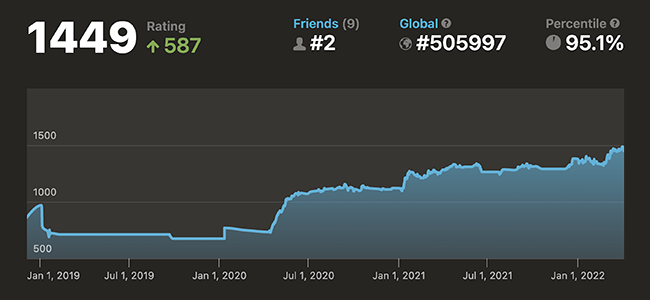Unlocking Life Lessons Through Chess: Insights from 500+ Games
Written on
Chapter 1: The Journey Begins
Three years ago, I embarked on an online chess adventure. Initially, I played casually for about a year, but my desire to improve led me to invest over 500 hours and engage in 6,839 games over the next two years. Now, I am an active member of a local chess club that meets weekly and have achieved a ranking in the top 5% of players on chess.com:

My passion for this challenging game has deepened, revealing striking parallels between chess and life itself. In this article, I will share those insights. No prior chess experience is needed to grasp these lessons—just a willingness to reflect on life.
Section 1.1: The Power of Perseverance
In chess, resigning is often seen as the honorable choice when defeat is imminent. However, if you believe there's still a chance to salvage the game, you should continue.
During my chess development, I found myself stuck around a 1300 rating—decent but not remarkable. Despite consuming countless videos and articles on tactics, my rating stagnated. One day, I encountered a Chessbrah video suggesting a simple principle: never resign and always seek a way to fight back.
I embraced this mindset, determined to defend my position and capitalize on my opponent's mistakes. This approach led to unexpected victories, transforming my game.
In life, just like in chess, progress requires resilience. Surrendering at the first hurdle limits your potential. I faced numerous setbacks before launching my blog and business three years ago. Yet, I committed to daily writing, disregarding excuses. This consistency has since brought my work to over a million readers and opened doors I never imagined.
The first video, "Life Lessons From 500+ Hours of Chess," provides a deeper understanding of these principles.
Section 1.2: Finding Opportunities
In chess, it’s often claimed that computers have changed the game, revealing moves that humans might overlook. Importantly, they teach us that there is usually a way to keep playing, even when the odds seem against us.
In a particularly challenging position, many players would give up, yet I learned that even when it appears bleak, a glimmer of hope might remain. The key is to recognize that opportunities often exist, even if they’re not immediately visible.
Similarly, in life, successful individuals often recount their experiences of rejection and failure before achieving their goals. Growing up, I faced skepticism from those around me when I aspired to succeed online. Nevertheless, I discovered paths to success through persistence and belief in my vision.
The second video, "5 Life Lessons from Chess," illustrates this concept effectively.
Chapter 2: Active Engagement
Section 2.1: Control Your Game
In chess, controlling the center of the board is crucial. Active play allows you to dictate the game's flow rather than merely reacting to your opponent's moves.
Napoleon famously stated, "The best defense is a good offense." If you adopt a reactive approach in life, you relinquish control. Recognizing that you shape your environment empowers you to tackle challenges head-on.
This concept is echoed in Stephen Covey's "The 7 Habits of Highly Effective People." Instead of letting external factors dictate your mood, you can maintain a positive mindset and approach your day productively, regardless of circumstances.
Section 2.2: Theory vs. Practice
Historically, learning chess demanded practical application rather than mere theoretical understanding. With modern technology, it’s easy to consume information without ever applying it.
In both chess and life, understanding principles means little without practice. Aspiring entrepreneurs often fall into the trap of consuming motivational content without implementing the ideas.
To escape stagnation, it’s essential to take action. Knowledge is important, but applying it is what drives real progress.
Section 2.3: The Potential of Small Ideas
Pawns may seem insignificant, yet if they reach the opposite end of the board, they can transform into powerful queens. This concept of "promotion" symbolizes the potential for growth and success.
In life, every idea holds potential. My graphic design instructor encouraged us to document even our seemingly trivial thoughts. What may appear insignificant at first could blossom into something remarkable if nurtured.
Embrace your ideas and strive to develop them. You never know which small thought might lead to a significant breakthrough.
Thank you for reading! I've compiled insights from 50 productivity experts into a comprehensive guide, available for free. Discover practical strategies from those who have successfully navigated their journeys.